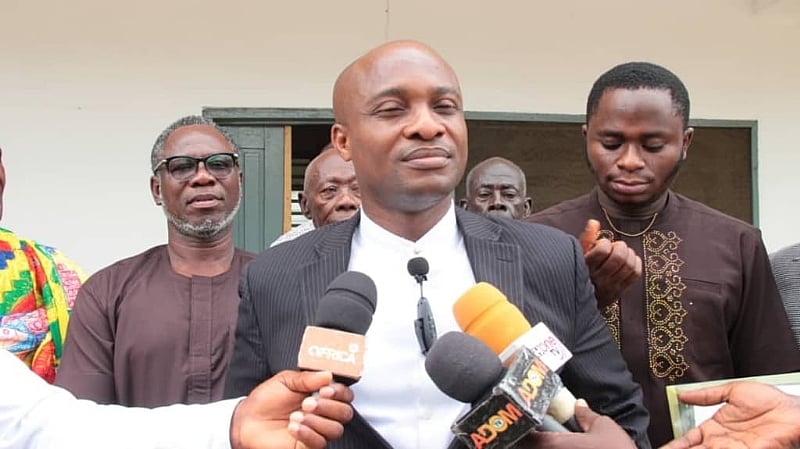The impending Akwatia by-election has set the stage for a compelling political showdown between the National Democratic Congress (NDC) and the New Patriotic Party (NPP). Lawyer Bernard Bediako Baidoo, the NDC’s parliamentary candidate, exudes unwavering confidence in his prospects, asserting that the palpable support from the electorate signals an impending victory. His conviction stems from what he perceives as a clear and positive resonance with the constituents, a sentiment he believes is a reliable indicator of electoral success. Drawing parallels with his legal background, Baidoo acknowledges the inherent uncertainties of both politics and the courtroom, where outcomes can defy expectations. Yet, he firmly maintains that the prevailing atmosphere in Akwatia distinctly favors the NDC. This unwavering optimism sets the stage for a closely contested election, with both parties vying for the seat left vacant by the late NPP MP, Ernest Yaw Kumi.
Baidoo’s confidence is not merely anecdotal; it is rooted in his perceived ability to “read the mood of the people,” a skill he considers essential for any astute politician. This intimate understanding of the constituency’s pulse, he believes, allows him to gauge the electorate’s inclinations with a high degree of accuracy. His legal training further informs his perspective, reminding him of the unpredictable nature of contests, where despite thorough preparation and compelling arguments, outcomes can be surprising. This nuanced understanding of both the predictable and unpredictable elements of political competition underscores his measured yet optimistic outlook. While acknowledging the possibility of unforeseen turns, he remains steadfast in his belief that the signs are overwhelmingly positive for the NDC.
On the other side of the political spectrum, the NPP, represented by miner Solomon Kwame Asumadu, presents a different narrative. Their campaign emphasizes continuity, urging voters to maintain the trajectory set by the late MP, Ernest Yaw Kumi. This appeal to stability and familiarity resonates with a segment of the electorate who value consistency and established relationships. The NPP’s strategy hinges on the premise that voters will opt for the familiar, choosing to maintain the status quo rather than embrace a new direction. This sets up a clear contrast between the NDC’s message of change embodied by Baidoo and the NPP’s emphasis on maintaining the established order.
The by-election takes place against the backdrop of the late MP’s legacy, a factor that inevitably influences the political dynamics. Kumi’s tenure and contributions to the constituency will undoubtedly be a focal point of the campaign, with both parties attempting to leverage his memory to their advantage. The NDC might highlight areas where they believe Kumi fell short, presenting Baidoo as a fresh start and an opportunity for improvement. Conversely, the NPP will likely emphasize Kumi’s achievements and present Asumadu as the natural successor to carry on his work. This interplay of past performance and future promises will be a key determinant in swaying undecided voters.
The Akwatia by-election represents more than just a contest for a single parliamentary seat; it symbolizes a broader struggle for political dominance in the region. The outcome will have implications beyond the immediate constituency, serving as a barometer of public sentiment towards both the ruling and opposition parties. A victory for the NDC would be a significant boost to their morale and could be interpreted as a sign of waning support for the NPP. Conversely, an NPP victory would solidify their hold on power and reaffirm their mandate. The election thus becomes a microcosm of national politics, with the local contest reflecting larger trends and potentially influencing future electoral outcomes.
Ultimately, the Akwatia by-election will be decided by the voters themselves, who will weigh the promises and arguments of both candidates. Factors such as local issues, party loyalty, and the candidates’ personal appeal will all play a role in shaping the final result. Baidoo’s confidence, rooted in his perceived connection with the electorate, contrasts with the NPP’s appeal to continuity. The election’s outcome will not only determine the next parliamentary representative for Akwatia but also provide valuable insights into the evolving political landscape of the region and the nation as a whole.














